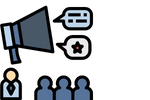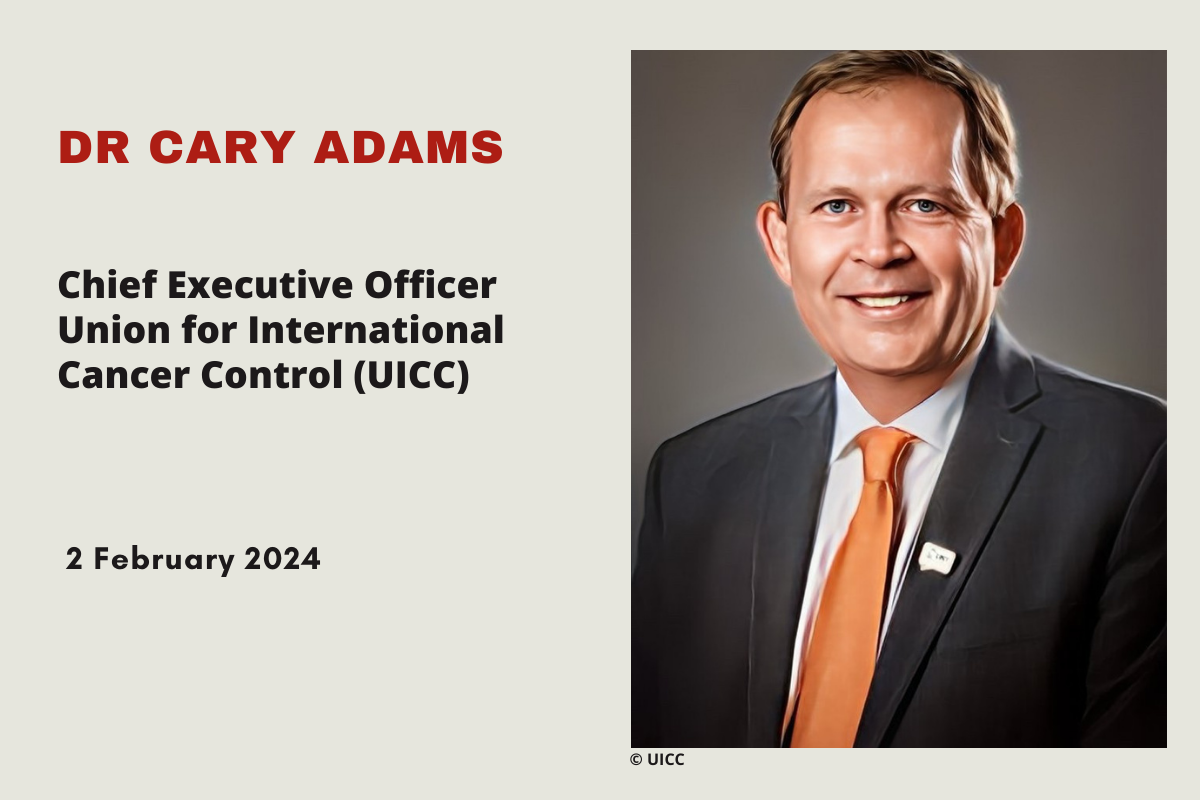The interview | Cary Adams
 |
How would you present your organization in a few words? What entails your position? What is your goal? |
The Union for International Cancer Control (UICC) is a global organization founded in 1933. It has some 1,150 member organisations in 172 countries and territories, including cancer societies, patient support groups, research and cancer centres, non-governmental organisations, grassroots organisations, professional associations, and government agencies shaping cancer control everywhere in the world.
UICC’s mission is to both unite and support the cancer community in its efforts to better prevent, treat, and manage cancer, and improve the lives of people living with cancer. We also aim to promote greater equity and ensure that cancer control remains a priority on the global health and development agenda.
As the CEO of UICC, my role involves providing strategic leadership, fostering collaboration, and ensuring the effective operation of the organisation. With my team, we organize the World Cancer Congress – which will be held this year in September in Geneva – and the World Cancer Leaders’ Summit, as well as the campaign, launched on 4 February, for World Cancer Day. We also provide grants and Fellowships for organisations and individuals, to provide knowledge sharing and technical skills for cancer prevention and treatment, particularly in low- and middle-income countries, and conduct advocacy at the international level.
Our vision is that no one dies from preventable cancer and treatable cancer, and that everyone has access to affordable screening, diagnosis, treatment and care.
 |
Among the concentration of actors in Geneva (IOs, NGOs, permanent missions, academia, and the private sector), who do you work with and how? |
UICC has consultative status with the United Nations Economic and Social Council (ECOSOC) and has official relations with the World Health Organization (WHO) and partnerships with the International Agency for Research on Cancer (IARC), the International Atomic Energy Agency (IAEA) and the United Nations Office on Drugs and Crime (UNODC). UICC also engages with some 60 partners, including associations, foundations, and private sector companies with whom we have developed long-term commitments based on shared ambitions.
UICC is a also founding member of the NCD Alliance, the McCabe Centre for Law & Cancer, the International Cancer Control Partnership (ICCP) and established the City Cancer Challenge Foundation (C/Can) in January 2019 and the Access to Oncology Medicines (ATOM) Coalition in May 2022.
By working closely with these entities, we aim to leverage collective expertise and resources to advance our mission of reducing the global cancer burden.
 |
What are the strengths and weaknesses of Geneva with regards to the development of your activity? |
Geneva serves as a hub for international organisations and diplomatic missions, offering an ideal environment for global health advocacy. Its strengths lie in the proximity to key decision-makers, facilitating engagement with international stakeholders.
However, this does mean a certain amount of competition for attention amidst numerous global issues and the need for sustained funding to support our work.
Geneva proved an excellent city in which to host UICC’s World Cancer Congress in 2022, in partnership with several UN agencies including WHO and the University Hospitals of Geneva (HUG). We welcomed 1,600 delegates from over 100 countries, and in our post-event survey, nearly 90% rated their experience in Geneva very good to outstanding. We are pleased that the Congress will again be held in Geneva this year, 17-19 September 2024.
 |
|
Global governance should evolve to be more inclusive, responsive, and adaptable to emerging challenges. Collaboration between governments, international organizations, civil society, and the private sector should be strengthened to address complex global issues effectively.
The Access to Oncology Medicines (ATOM) Coalition is a good example of this, where we work with over 40 partners to address the barriers to availability, affordability, and appropriate use of essential medicines in low- and lower-middle income countries (LLMICs)
Additionally, a greater emphasis on sustainability, equity, and innovative solutions will be crucial in shaping a more resilient and equitable global governance framework for the future.
A step in this direction is the cancer initiatives launched by WHO to address breast cancer, cervical cancer, and childhood cancer.
 |
|
A question I'd appreciate being asked is, "How can Geneva help UICC advance its mission?" One way to support our work would be to actively promote primary cancer prevention in Geneva and reduce people’s exposure to risk factors, notably tobacco use. There are effective measures such as plain packaging and taxation to reduce smoking, and therefore downstream-related cancers. It would also be good to see much stricter regulation around e-cigarettes, as we know that young adults are the primary target for companies selling these products, they are addictive and there are indications that vaping in early teens leads to heavy smoking.
What keeps me "awake at night" is two-fold. First, the fact that too many individuals around the world face significant challenges to accessing cancer services even when they are available, due to age, ethnicity, financial means or education levels, where they live, their gender or sexual orientation, or physical or mental disability.
This year for World Cancer Day, we have issued a global call to action for individuals to contact their respective health authorities asking them to prioritise cancer. As we highlight in our Close the Care Gap campaign for World Cancer Day campaign, there is a pressing need to ensure that quality cancer services – health literacy on risk factors and the need for routine screening, prevention programmes including screening and diagnosis, and quality treatment and supportive and survivorship care – reach underserved communities globally.
What also keeps me up at night in this challenging financial environment is sustainable funding for UICC to continue effectively to convene and support cancer organisations around the world.
